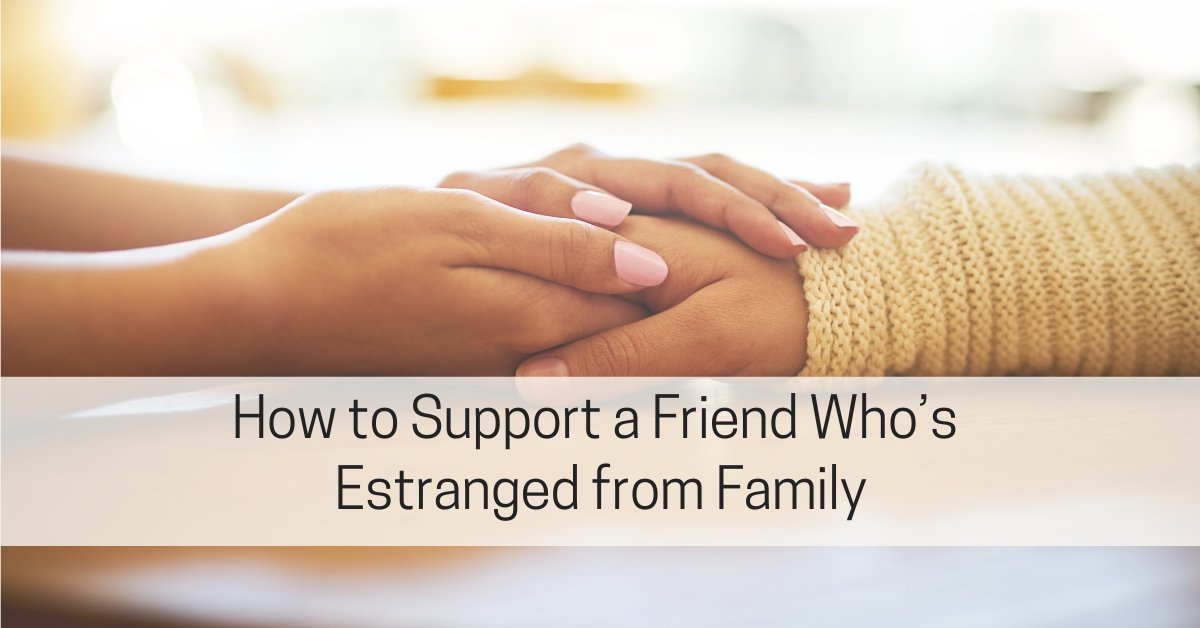Being estranged from family—even when it’s by choice—is a painful experience. A robust support network can help people cope and recover from the effects of dysfunctional or abusive relationships and stigma of family estrangement.
This article will help you understand the importance of support for those experiencing family estrangement and offer tips from my book, Cutting Ties with Your Parents, on how to support a friend who is estranged from their family, including what to say and do, things to avoid, and ways to include them in your family gatherings.
Understanding Family Estrangement and the Need for Support
Estrangement is the result of complex family situations, often involving ongoing conflicts, emotional abuse, or toxic dynamics. It’s important to recognize that even when cutting ties is in someone’s best interest, it’s a difficult choice—and not one that is made lightly. Most adult children agonize over their decision to cut ties for years prior to doing so. It’s usually a decision of last resort, one that follows years of hurtful treatment by their parents and failed efforts to maintain the relationship only to be hurt again and again (Agllias, 2016, 2018; Scharp, 2016; Scharp et al., 2015).
Unfortunately, people who are estranged from family often report that their friends and family members are not supportive or judge them harshly for cutting ties with a family member (Agllias, 2018; Scharp, 2016). And stereotypes that adult children who cut ties with their parents are childish, ungrateful, and cruel contribute to high levels of isolation, loneliness, shame, and social stigma among this population (Agllias, 2018; Rittenour et al., 2018; Scharp, 2016).
You can be an important source of support! So, let’s get started with some actionable ways to support a friend, colleague, or family member who’s experiencing family estrangement or strained family relationships.
Supportive Things to Say and Do
- Express empathy and validate their feelings. Recognize that estrangement is a significant loss and can be as painful as any other type of loss
- Examples: “I’m so sorry you’re going through this. It must be really tough.”
- “Your feelings are completely valid. It’s okay to feel hurt and angry.”
- Listen without judgment. When people share their experiences, emotions, and thoughts surrounding family estrangement, it’s not our place to pass judgment. Aim to be a good listener; give them your full attention so they experience your care and acceptance.
- Example: “I’m here for you if you ever need to talk or vent.”
- Check Your Biases. If you have a hard time providing empathy and non-judgmental support, it may be due to preconceived notions or unconscious biases about family relationships and estrangement. Most of us were taught that family is forever, and we should maintain family ties at all costs. And if you grew up in a reasonably functional family, it may be hard to believe that some family relationships are a source of immense pain and trauma.
- Questions for self-reflection: What was I taught about family relationships? Are there ever acceptable reasons to sever ties? If so, who gets to decide what’s a valid reason?
- Include your friend in your family activities. Invite them to family gatherings, holidays, and celebrations. This can help your friend feel less alone, especially during family-centered holidays.
- Examples: “I’m hosting my family for Thanksgiving this year. I’d love for you to join us.”
- “Our door is always open for you, no matter the occasion.”
- Offer physical affection, if you’re both comfortable. Sometimes a hug or a gentle touch on the shoulder can offer more comfort than words.
- Respect their boundaries. This may include understanding their need for time alone or distance from certain topics. Don’t suggest that they reconcile or re-establish relationships unless they express a desire to do so. And if you know their family, don’t share family updates unless your friend has asked you to.
- Example: “If you want to talk about your family, I’m here, but I don’t want to overstep so I’ll let you take the lead.”
- Support their choices, whether it’s maintaining estrangement, seeking therapy, or any other choices they make for their well-being. It’s generally unhelpful—and sometimes condescending—to act as if you know more about what’s right for someone than they do.
- Example: “I support whatever decisions you make for your own well-being.”
- Celebrate their milestones. Acknowledge and celebrate birthdays, achievements, and other important events in their life.
- Example: “I’m so happy for you! Let’s celebrate your promotion together.”
- Offer practical help. People who are estranged from family may need help with tasks that family members typically assist with, such as acting as an emergency contact, providing a ride home after surgery, or childcare. If you’re in a position to help, it can lighten your friend’s stress in meaningful ways and also strengthen your friendship.
- Example: “If you ever need a ride to the airport or a medical appointment, let me know. I’m willing to help.”
- Have fun together. Engage in activities together that bring joy, distraction, and a sense of normalcy. Invite your friend to do a shared hobby, see a movie, or another activity that can help take their mind off their family and provide moments of happiness.
- Example: “I’ve been wanting to see the new Marvel movie. Are you around this weekend? It would be fun to go together.”
Things to Avoid Saying or Doing
- Avoid judgmental comments. Be mindful that you don’t say or imply that estrangement is wrong or that your friend should reconcile with their family unless they express a desire to do so.
- Examples: “I could never cut off my family.”
- “How can you abandon your parents after all they’ve done for you?”
- “You people are so quick to end relationships. They need to learn to work things out!”
- Don’t minimize their experience. Doing so invalidates their pain and suggests that you know better than they do.
- Example: “Your family can’t be that bad.”
- Avoid pressuring them to reconcile. Respect their decision and avoid pushing them towards reconciliation or actions they’re not comfortable with.
- Example: “You should try to make up with your family. You’ll regret it if you don’t.”
- Don’t share private information. When a friend confides in us about their family difficulties, it’s crucial to respect their privacy. Don’t share their personal stories or details without their explicit permission.
Conclusion
People experiencing family estrangement need unconditional support and empathy. They don’t need unsolicited advice or guidance on how to reconcile. The kindest and most respectful way to help is to ask what kind of support they need and provide it, if possible. When we make assumptions about what people need we’re often wrong and as a result, do things that are either not helpful or are hurtful.
You can be an important source of support to a friend who’s experiencing estrangement and using these tips can help you create an environment where family estrangement is met with understanding, acceptance, and genuine compassion.
©2024 Dr. Sharon Martin, LCSW. All rights reserved. Photos courtesy of Canva.com.
“A step-by-step guide to navigating the complex emotions and practical considerations involved in this courageous choice. This workbook is a road map for healing and empowerment.”
-Tracy A. Malone, founder of Narcissistic Abuse Support
References
Agllias, K. (2016). Disconnection and decision-making: Adult children explain their reasons for estranging from parents. Australian Social Work, 69(1), 92–104.
Agllias, K. (2018). Missing family: The adult child’s experience of parental estrangement. Journal of Social Work Practice, 32(1), 59-72.
Rittenour, C., Kromka, S., Pitts, S., Thorwart, M., Vickers, J., & Whyte, K. (2018). Communication surrounding estrangement: Stereotypes, attitudes, and (non) accommodation strategies. Behavioral Sciences, 8(10), 96.
Scharp, K. M. (2016). Parent-child estrangement: Conditions for disclosure and perceived social network member reactions. Family Relations, 65(5), 688–700.
Scharp, K. M., Thomas, L. J., & Paxman, C. G. (2015). “It was the straw that broke the camel’s back”: Exploring the distancing communicatively constructed in parent-child estrangement backstories. Journal of Family Communication, 15(4), 330–348.
Publisher: Source link





